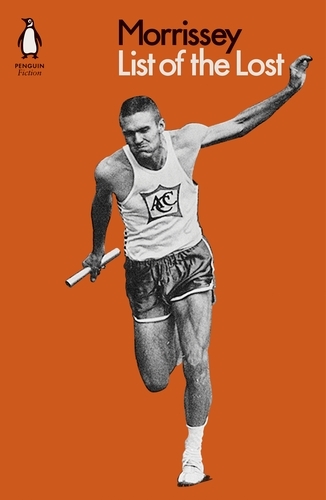What do you think?
Rate this book


128 pages, ebook
First published September 24, 2015
’Beware the novelist… Intimate and indiscreet… pompous, prophetic airs… here is the fact of fiction… an american tale where, naturally, evil conquers good, and none live happily ever after, for the complicated pangs of the empty experiences of flesh-and-blood human figures are the reasons why nothing can ever be enough. To read a book is to let a root sink down. List of the Lost is the reality of what is true battling against what is permitted to be true’.
Ezra, Nails and Justy felt a love for each other that prospered without the sexual, or found prosperity precisely because the sexual did not make propositions. But as their spirit forever struggles with the flesh, who is to say that their closeness was not in fact a liberating scream of the intensely sensual? Does anybody know? Can anybody control the inestimable effects of touch? Their outcome was fortunate and felt certain to last. Erotic at times, yes, but safely unsaid. Are we always waiting for life to stop? If you give someone the yes or no option, isn’t it true that they will always choose the no?
Surrounded by women, some mechanically minded, some badly made-up, and all envious of one another, the boys had heartily gnawed at their iron bars and unwisely allowed alcohol a free dash at their brains because things overall mattered a little less since their track timings were now a bed of roses and their overall fitness boomed good times ahead, and what harm would a little devilment do?
Look at them now in their manful splendor and wonder how it is that they could possibly part this earth in dirt, as creased corpses, falling back as the skeletons that we already are, yet hidden behind musculature that will fall in time at life’s finishing line.
[...]
It is certainly something to dwell excitedly within a body that fully and proudly shows whatever the person is, since we all, for the most part, struggle in haunted fashion, unaware of ourselves as flesh, looking at a future that does not show promise, or back at a past that couldn’t provide any, and permanently petrified at passing through without ever having lived.
[...]
The body is a thing only, of which we all irrationally fear … how to control, how to control … that which controls us.
Although the publicly confessed lust of the man must always be made to seem ridiculous and prepubescent, the lust of the woman is at first childlike and desperate – as if they know there is something about which they know nothing, and this itch takes on the aggressive – which almost never works.
Women are less of a mystery because their methods and bodies have been over-sold, whereas the male body speaks as the voice calls a halt.
I hate womb-men like that…they just can’t wait to be one of the boys…and just watch, if she becomes prime minister she won’t hire any women into her government. Why do I even care? I mean, just look at her face.
Justice and the law are two entirely different things.
Unless I am with you I shall never be where I belong.
Look at the blue of the sky and tell me why you held back. Did you think there would one day be a bluer sky and a better hour?
“I thought you’d said goodbye?” said Nails, nursing his hand. “Nails. To you … someone will always be saying goodbye …” Rims threw his final dart. With that he walked away.
In the church of secret service known as the abattoir this is exactly what humans excitedly do to beautiful bodies of animals who were also crafted in care by some divine creationist, yet at the human hand the animals are whacked and hacked into chopped meat whilst gazing up at their protector with disbelief and pleading for a mercy not familiar to the human spirit, ground and round into hash or stew for the Big Mac pleasure of fat-podge children whose candidature for roly-poly vicious porkiness makes their plungingly plump parents laugh loudly, as little junior blubber-guts orders yet another Superburger with tub-of-guts determination to stuff death into round bellies, and such kids come to resemble their parents as ten pounds of shit in a five-pound bag.
Reagan has no time for black power, women’s rights, gay liberation, animal rights, anti-war rallies or student demonstrations. He contrasts all of the exciting changes that made America new again, and he offers old-fashioned power-politics, the type of which must always keep a profitable war on the go … everything old (including himself ) sold off like fake insurance to the all-powerful conglomerate America of Bonanza, a rich and expertly presented daily television drama where cow-rustling Ben Cartwright lives handsomely with his three sons (none of whom share one single gene, since all three are of different mothers, and, magically, all three mothers are either dead or hidden behind studio curtains).
[...]
and although deity Ben Cartwright had fathered three sons from three women who had usefully dissolved into tumbleweed, his three strapping sons themselves do not reproduce and almost never pair off for passionate romance.
At this, Eliza and Ezra rolled together into the one giggling snowball of full-figured copulation, screaming and shouting as they playfully bit and pulled at each other in a dangerous and clamorous rollercoaster coil of sexually violent rotation with Eliza’s breasts barrel-rolled across Ezra’s howling mouth and the pained frenzy of his bulbous salutation extenuating his excitement as it whacked and smacked its way into every muscle of Eliza’s body except for the otherwise central zone. Both fell awkwardly off the bed, each tending to their own anguish yet still laughing an impaired discomfort of giggles whilst curving into a hunched disadvantage.